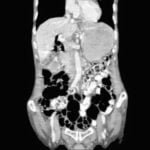Patient instructions before Ultrasound abdomen.
What Does an Abdominal Ultrasound Involve?
An abdominal ultrasound is a test that uses sound waves to create pictures of the inside of your belly. These sound waves are not heard by our ears and when these. strike an organ , an image is formed Doctors use it to look at the organs in your abdomen, like the liver, gallbladder, pancreas, spleen, and kidneys. It can also check the aorta, the main blood vessel from the heart. This test shows the size of your organs, how well they’re working, the blood flow, and if there’s any injury or disease.

How Do I Get Ready for an Abdominal Ultrasound?
Your doctor will tell you if you need to do anything special to get ready. This depends on why you’re having the ultrasound and which organs they need to check. You might be asked to:
- Not eat anything for 8 to 12 hours before the test.
- Have a fat-free meal the evening before the test.
- Drink a few glasses of water before the test and avoid going to the bathroom until after the test.
In many cases, you don’t need to do anything special beforehand
Understanding the Process of an Abdominal Ultrasound
- The doctor, nurse, or technician will put some gel on your belly.
- They will press a thick wand, called a “transducer,” against your skin and move it around. This will create pictures of your organs on a computer screen. Sometimes, the images are in color to show blood flow.
- The test doesn’t usually hurt, but you might feel some pressure from the wand. You may need to change positions or hold your breath for a few seconds during the test.
- An abdominal ultrasound usually takes about 30 minutes.
- The gel will be wiped off your skin, and you can get dressed.
- The doctor will review the ultrasound results to understand any problems in your abdomen.
- You might need more tests or procedures based on the results. Discuss the results with your doctor to understand what they mean.
What Are the Potential Complications of an Abdominal Ultrasound?
An abdominal ultrasound is usually safe and doesn’t have health risks. Unlike an X-ray or CT scan, it doesn’t expose you to radiation.
Join the mailing list!
Get the latest articles delivered right to your inbox!



